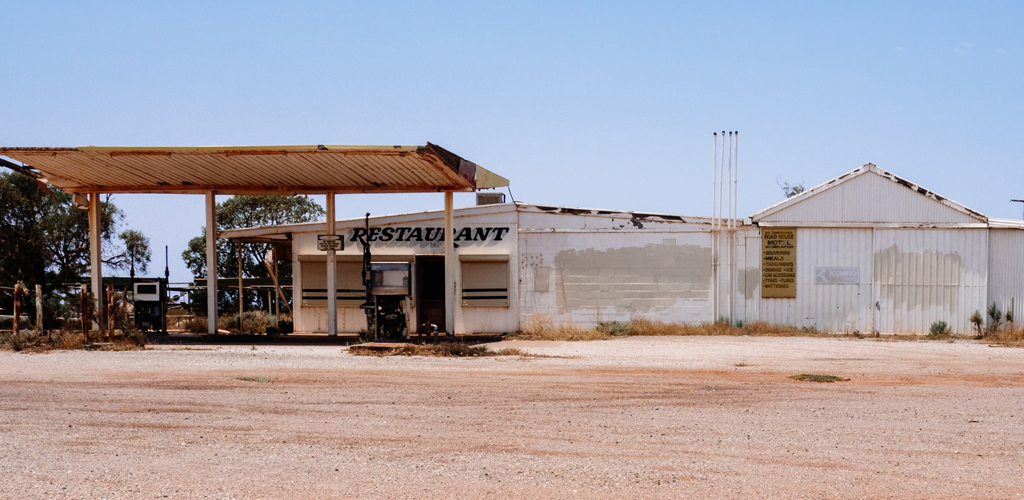Remember the night he turned up at the roadhouse? We were on the graveyard shift. I was mopping the floor, you were counting the till, looking busy for the CCTV. We’d had strange types walk in before, but he was a sight. And the smell of him, it made me gag. Sour, unwashed — a combination of horse and sweat and piss, and underlying that, a slow-burning anger.
You played it cool; you barely glanced his way as he blinked under the fluorescent light. At the fridges he deliberated over the Gatorade two-for-one deal. He wandered the shelves, wavered between beef jerky and Cheezels, tried on sunglasses, flicked through a Country Style magazine. I kept him in my sightline. We’d been held up before by unemployed kids from town. Now and then a truckie would go apeshit because the self-serve coffee dispenser was out-of-order. You never could tell.
At the counter, he asked for a packet of roll-your-owns, and where he could water his horse. And did we have any Uncle Toby’s rolled oats? Your face softened, and you looked out the automatic doors. The horse was done in, reins looped over the ULP fuel bowser, one back hoof off the ground, head lowered. ‘Watch the till,’ you said, and walked outside. He followed, with the stiff rolling gait of a horseman. Even then, I didn’t twig. I thought it was a girls and horses thing.
Weeks later you came clean. Sitting in the bar of the Ben Hall, Tuesday Parma & Pot special. ‘The theme park,’ you said, forking soggy chips into your mouth. You’d both picked up casual shifts last year. You were the barmaid, he was the outlaw. But the whole operation went belly up not long after, something about insurance. The final week, he’d veered off script. Smashed his glass of apple juice pretending to be whiskey on the floorboards and stormed off the stage. Missed the stirrup twice, then managed to get astride the horse and gallop away. No-one knew whether it was part of the show, or something else entirely. ‘He occasionally went improv,’ you said. ‘He was good at the role. That’s why he got the job. Anyway,’ you shrugged. ‘It’s all history.’ The next day, the 19th century shop facades were dismantled and loaded onto trucks, and you were all out of pocket eight weeks’ pay.
‘But that was months ago, and he’s still out there?’
You nodded.
‘The guy sounds like a nutter,’ I said.
He became a regular, showing up once a week for supplies. He was holed up in that tract of Forestry Corporation land west of town. The old growth had been cut out years before, replanted with fast-growing Radiata pine. It was clear he’d taken a shine to you. I guess it was lonely out in those pines. ‘Highway robbery,’ he would crack, paying for his cappuccino and slice of banana bread, and you’d roll your eyes, but in a way you never rolled your eyes at me.
The thing is, as far as bushrangers go, he was pretty average. No-one cared about his one-man protest. The only person who’d gone to actively search for him was a DHHS social worker, who’d trekked out into the scrubby foothills, but aborted her mission when it began to rain.
He began letting down his guard, turning up in broad daylight. Once, on lunch shift, I was grabbing an apron from the linen press, when I spied the two of you by the back door, deep in conversation. You were face to face, I could see your straight spine, the curve of your jaw. You didn’t know I was there, but I heard it all. You told him he was stuck in the past. ‘I’m doing this for you, for us,’ he replied. He reached across to touch you, but you didn’t respond. You were a statue, staring back hard and unblinking.
He turned and stomped away to his horse. The midday sun was harsh on his face. He was the type who looked better in soft sepia tones.
I never pretended to be heroic. But I guess I thought if I was just there, day after day, eventually you’d see me the way I saw you.
I crossed paths with him six months later, in the JobsRUs office in town. It took me a second to recognise him. He’d cleaned up, had a shave, there was the distinct whiff of Rexona deodorant. But the horse was the giveaway, on the footpath outside, nibbling the corner of the window pane, its lips curled back and long teeth protruding. Pedestrians stepped around it, just another obstacle, something they didn’t look at twice. He went up to reception and asked whether there were any jobs going at the gold mine. You were long gone by then, and my shifts at the roadhouse had been cut right back.
Sometimes I think about you. Call me romantic. I like to imagine you’ve made it to some better place. But then again, maybe your life is not so different from mine.
‘Someone will be with you shortly,’ the receptionist says. Opposite me, in an orange plastic chair, he’s there, chewing on the end of a Biro, filling in his Job Search form. I don’t think he knows who I am. He only ever had eyes for you when he came to the roadhouse. A sharply-dressed lady emerges from an office and gestures for him to follow her. ‘What experience do you have?’ I hear her ask, as she guides him towards her door. ‘I used to be a bushranger,’ he says.
…
Biography
Catherine Deery lives in Bendigo, Australia. Her flash fiction has been commended in the Bath Flash Fiction Award and shortlisted for the Smokelong Quarterly Micro Competition.
Image: unsplash.com





